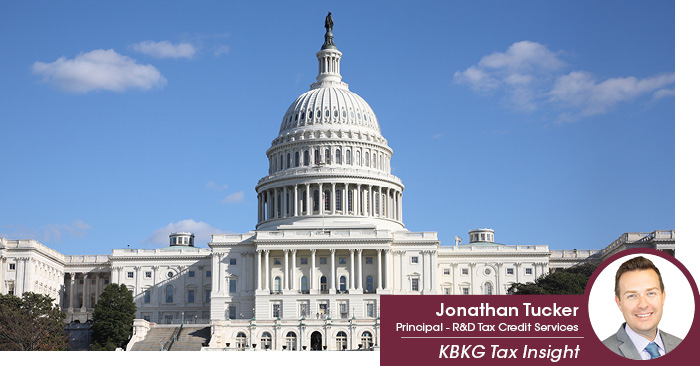By Jonathan Tucker | Principal, Research & Development Tax Credits
The House passed a Continuing Resolution (“CR”) (217-214), which aims to fund the federal government through September 30, 2025. Adjustments to defense funding see a $6 billion increase, and non-defense spending faces a $13 billion reduction, along with some budgetary authority shifts.
KBKG Insight:
While CRs have become commonplace in Congress, this is slightly different in that it gives the executive branch more control over some spending decisions, a task usually left to the legislative branch.
Non-defense spending reductions touch various departments, including the Internal Revenue Service (IRS), which could impact the tax filing season and refunds. The IRS plans to lay off between 6,000 and 7,000 employees, potentially affecting tax return processing and enforcement capabilities during the peak tax-filing season. If this CR does not pass the Senate, there could be a government shutdown, which would impact IRS processing even more.
Budgetary Authority Shifts
The resolution grants the executive branch increased discretion over certain spending decisions. This shift in budgetary authority has raised concerns among Democrats about potential fund reallocations without congressional oversight.
Potential Issues in the Senate
The proposed non-defense spending cuts and the shift in budgetary authority are expected to face scrutiny in the Senate. The reductions in non-defense programs may encounter resistance from both Democrats and some Republicans, especially those representing constituencies adversely affected by the cuts. However, most Republicans will likely vote for the CR, with the exception of Senator Paul of Kentucky, who likely will vote no based on his principle that CRs should not happen.
However, Democrats have expressed greater concern over the spending discretion granted to the executive branch, which could be seen as undermining Congress’s authority over federal expenditures, a point that is likely to spark debate in the Senate. While Republicans have not voiced strong opposition, this shift could pose challenges for them in the future if an opposing party were to leverage this change to further its own agenda, if they were to gain control of the executive branch at some point in the future.
Given these factors, achieving the necessary 60-vote threshold for passage in the Senate may prove challenging, necessitating bipartisan negotiations to address the concerns raised by the proposed spending adjustments and authority shifts.
Conclusion
KBKG and its experts have remained on top of this and many other legislative topics to provide taxpayers with the most up-to-date information and advice. Taxpayers are encouraged to consult with a specialized tax expert, like KBKG, to learn how to navigate the complexities of the US tax code. Those interested in learning more about KBKG’s services are encouraged to contact its experts below.
About the Author
Jonathan Tucker | Principal – Research & Development Tax Credits
Jonathan Tucker is based in Atlanta, GA, and has over 20 years of experience providing federal business tax advisory services, primarily in R&D tax credits, to clients in various industries including technology, manufacturing, transportation, healthcare, retail and consumer products, hospitality, media and entertainment, financial, and other professional services industries. Read More



